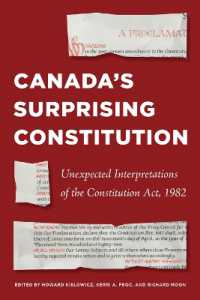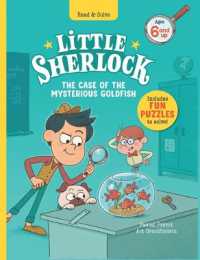- ホーム
- > 洋書
- > 英文書
- > Philosophy
Full Description
Is each of us the main character in a story we tell about ourselves, or is this narrative understanding of selfhood misguided and possibly harmful? Are selves and persons the same thing? And what does the possibility of sudden death mean for our ability to understand the narrative of ourselves? These questions have been much discussed both in recent philosophy and by scholars grappling with the work of the enigmatic 19th-century thinker Søren Kierkegaard. For the first time, this collection brings together figures in both contemporary philosophy and Kierkegaard studies to explore pressing issues in the philosophy of personal identity and moral psychology. It serves both to advance important ongoing discussions of selfhood and to explore the light that, 200 years after his birth, Kierkegaard is still able to shed on contemporary problems.
Contents
Introduction, John Lippitt and Patrick Stokes; 1. The Moments of a Life: On Some Similarities between Life and Literature,Marya Schechtman; 2. Teleology, Narrative, and Death, Roman Altshuler; 3. Kierkegaard's Platonic Teleology, Anthony Rudd; 4. Narrative Holism and the Moment, Patrick Stokes; 5. Kierkegaard's Erotic Reduction and the Problem of Founding the Self, Michael Strawser; 6. Narrativity and Normativity, Walter Wieizke; 7. The End in the Beginning: Eschatology in Kierkegaard's Literary Criticism, Eleanor Helms; 8. Forgiveness and the Rat Man: Kierkegaard, 'Narrative Unity' and 'Wholeheartedness' Revisited, John Lippitt; 9. The Virtues of Ambivalence: Wholeheartedness as Existential Telos and the Unwillable Completion of Narravives, John J. Davenport; 10. Non-Narrative Protestant Goods: Protestant Ethics and Kierkegaardian Selfhood, Matias Møl Dalsgaard; 11. Narrativity, Aspect, and Selfhood, Michael J. Sigrist; 12. The Senses of an Ending, Kathy Behrendt; 13. The End? Kierkegaard's Death and its Implications for Telling his Story, George Pattison.








